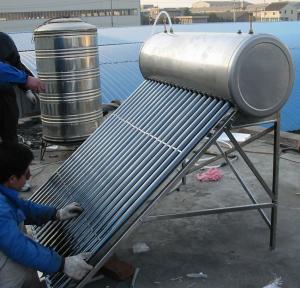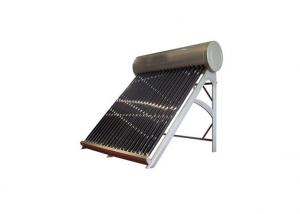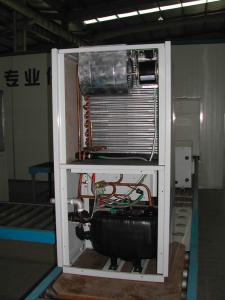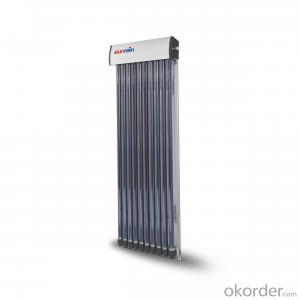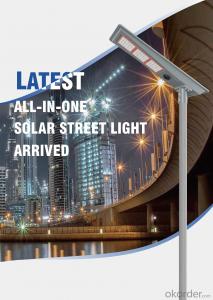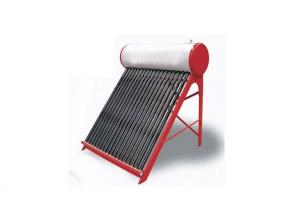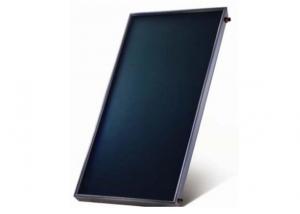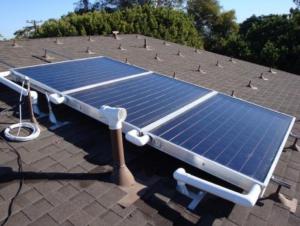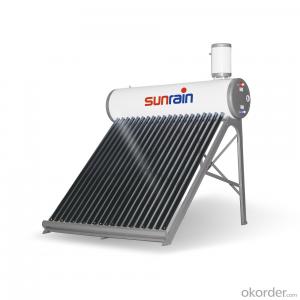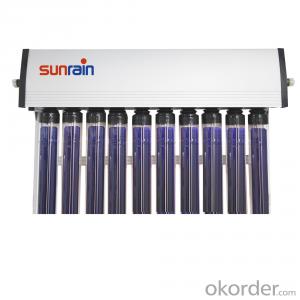Vacuum 20 Tube Solar Collector China Top Supplier
- Loading Port:
- China main port
- Payment Terms:
- TT OR LC
- Min Order Qty:
- 10 set
- Supply Capability:
- 10000 set/month
OKorder Service Pledge
OKorder Financial Service
You Might Also Like
Solar water heaters features
1. The upright tank can make the water temperature to a high level. It can hot the water instantly
2. The tank inside the building, the hot water loses less energy than the normal one
3. The solar collector and the tank of solar water heater is separated, that makes the system combine with the building perfectly, which will reduce the sightseeing for the building and environment around
4. Back up with electric heater so that in the day without sunshine hot water can also be used
5. Can be combined with gas or electric heater
6. Max. Pressure: 12bar; Operating Pressure: 6 bar
7. It can be used for other function, such as warming
Solar water heaters working principle
1. The solar collector absorbs solar energy and transmits it to the solar water heater tank through circulation
2. When the temperature of the collector reaches the set value, the controller starts the circulation pump automatically
3. The circulation pump makes heat-conducting liquid circulate automatically
4. The heat-conducting liquid transfers heat to water by lower heat exchanger in the water tank.
5. When the temperature difference between solar collector and heat pipe solar water heaters tank doesn't reach the set value, the circulation pump will be shut automatically
6. In case the temperature of the water tank does not reach Tmax, Electric Heating Element will start to work automatically
Solar water heaters working station component:
1. Operating screen
2. Manometer
3. Pump speed adjust switches
4. Temperature difference circulation pump
5. Flow rate indicator
6. Return circuit connector
7. Safety valve
8. Expansion vessel connector9. Return circuit connector
10. Wall mounting
11. Expansion vessel:8L
12. Pressure resistance: 10 bar pressure for expansion vessel
Solar water heaters specification:
Description | solar water heaters |
Material of out manifold | 0.55mm thickness color steel/ fluorine carbon steel |
Material of inner tank | Food grade 2.0 mm thickness SUS304 stainless steel |
Tank insulating layer | 40mm 45kg/m³ high-density polyurethane foamed |
Inlet and outlet hole | Male G1'' |
Max pressure | 0.6 Mpa |
Solar collector tube | 3.3 Borosilicate glass with N/Al coating |
Thickness of glass tube | 1.6mm |
Vacuum tube tightness | P≤0.005 Pa |
Absorption | as=0.93-0.96 (AM1.5) |
Emission ratio | εh=0.04-0.06 (80C±5C) |
Idle sunning property parameters | Y=220~260m2.C/KW |
Average heat loss coefficient | ULT=0.6~0.7W/(m2.C) |
Bracket: | 2.0mm thickness aluminum alloy |
Tank weight | 75KGS |
Tank size | 560mm Dia x 1810mm Height |
Tank capacity | 300L |
Solar collector | 2pcs 58x1800x15tube solar collector |
Absorber area | 2.811 m² |
Working station | SP116 working station |
Heat exchanger length | Upper:12m, Underside:18m |
Solar water heaters details show:
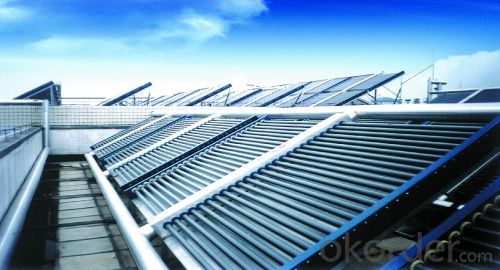
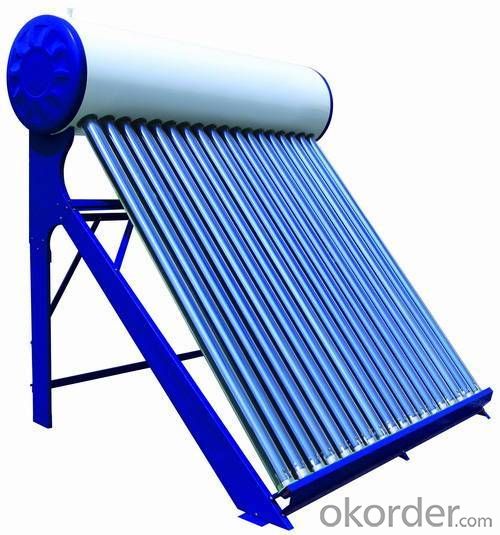
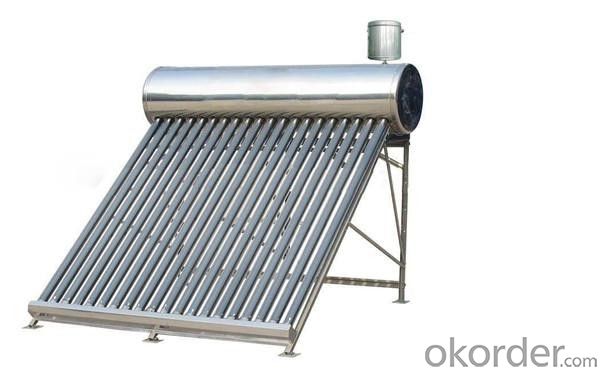
Benefits of this kind of solar water heaters:
1. Prolong the life of your existing water heater
2.Costs less than an electric, gas or oil water heater
3.No maintenance required
4.Lasts longer than a traditional hot water heater
5.Reduce your water heating costs
- Q:Can a solar water heater be used in areas with limited access to biofuels?
- Solar water heaters can be used in areas with limited access to biofuels. Unlike traditional water heaters that rely on fossil fuels or biofuels, solar water heaters use the sun's energy to heat water. They consist of panels that capture sunlight and convert it into heat, which is then used to warm the water in a tank. Solar energy is abundant and freely available in most areas, making it a viable alternative to biofuels in regions where access to such fuels is limited. By utilizing solar water heaters, one can have a sustainable and environmentally friendly option for hot water without relying on biofuels. This reduces dependence on limited resources and minimizes the carbon footprint.
- Q:What are the benefits of using a solar water heater?
- There are several benefits of using a solar water heater. Firstly, it helps in reducing energy costs as the sun's energy is free and abundant. This can lead to significant savings on electricity or gas bills. Secondly, solar water heaters are environmentally friendly as they do not emit greenhouse gases or contribute to pollution. They utilize renewable energy, thereby reducing reliance on fossil fuels. Additionally, solar water heaters require minimal maintenance and have a long lifespan, making them a cost-effective and durable solution. Moreover, using solar energy for heating water can help in reducing the demand on the electrical grid, leading to a more reliable and stable energy supply.
- Q:What is the role of a backup heating system in a solar water heater?
- The role of a backup heating system in a solar water heater is to provide hot water when the sun's energy is not sufficient to meet the demand. Solar water heaters utilize the sun's energy to heat water, but during periods of low sunlight or high water usage, the backup heating system kicks in to ensure a continuous supply of hot water. The backup heating system can be powered by electricity, gas, or another conventional energy source. It acts as a supplementary heat source, helping to maintain the desired temperature of the water in the storage tank. Having a backup heating system is crucial for uninterrupted hot water supply, especially during cloudy days, winter months, or when the solar water heater's capacity is exceeded. It provides reliability and prevents any inconvenience caused by inadequate hot water availability. Furthermore, a backup heating system also serves as a safeguard against system failures or maintenance issues with the solar water heater. If the solar components require repair or replacement, the backup system ensures that hot water is still available until the solar system is back in operation. In summary, the backup heating system plays a vital role in a solar water heater by providing a reliable source of hot water during periods of low solar energy, high demand, or system downtime. It ensures continuous hot water availability and offers peace of mind to the users of solar water heating systems.
- Q:How does a solar water heater impact the resale value of a home?
- A solar water heater can positively impact the resale value of a home. It is considered a valuable and sustainable feature that can attract potential buyers who prioritize energy efficiency and cost savings. Additionally, having a solar water heater can enhance the overall appeal and marketability of the property, potentially increasing its resale value.
- Q:What is the impact of water pressure on the performance of a solar water heater?
- The water pressure directly affects the performance of a solar water heater. Higher water pressure allows for faster flow rate, which improves the heat transfer efficiency and overall performance of the system. Insufficient water pressure, on the other hand, can lead to reduced flow rate, decreased heat transfer, and diminished system efficiency. Therefore, maintaining adequate water pressure is crucial for optimal performance of a solar water heater.
- Q:Are there any government incentives or tax credits available for solar water heaters?
- Yes, there are government incentives and tax credits available for solar water heaters. In many countries, including the United States, there are federal, state, and local programs that offer financial incentives to promote the installation of solar water heaters. These incentives can include tax credits, rebates, and grants, which help offset the initial cost of purchasing and installing a solar water heater. It is advisable to check with local government agencies or consult a professional to determine the specific incentives and tax credits available in your area.
- Q:How does the type of insulation material impact the performance of a solar water heater?
- The type of insulation material used in a solar water heater greatly impacts its performance. Good insulation is crucial for maintaining the temperature of the water inside the heater. High-quality insulation materials, such as foam or fiberglass, have excellent heat retention properties, minimizing heat loss and maximizing energy efficiency. This ensures that the water stays hot for longer periods, even during colder weather or at night. On the other hand, poor insulation materials or inadequate insulation can result in significant heat loss, reducing the overall effectiveness and efficiency of the solar water heater.
- Q:Can a solar water heater be used in areas with high levels of pollution?
- Yes, a solar water heater can be used in areas with high levels of pollution. While pollution may decrease the efficiency of the solar panels, it does not completely render them useless. The solar water heater will still be able to harness sunlight and convert it into heat energy, albeit at a slightly reduced efficiency. Regular cleaning and maintenance of the panels can help mitigate the impact of pollution and ensure optimal performance.
- Q:Are there any health risks associated with using a solar water heater?
- No, there are no direct health risks associated with using a solar water heater. Solar water heaters are a safe and environmentally friendly alternative to traditional water heating methods, and their use does not pose any specific health hazards.
- Q:Can a solar water heater be used in areas with frequent hurricanes or storms?
- Yes, a solar water heater can be used in areas with frequent hurricanes or storms. However, additional precautions need to be taken to ensure the system's durability and safety during extreme weather events. Proper installation, securing the system against strong winds, and appropriate maintenance can help mitigate potential damage and ensure reliable operation even in storm-prone areas.
1. Manufacturer Overview |
|
|---|---|
| Location | |
| Year Established | |
| Annual Output Value | |
| Main Markets | |
| Company Certifications | |
2. Manufacturer Certificates |
|
|---|---|
| a) Certification Name | |
| Range | |
| Reference | |
| Validity Period | |
3. Manufacturer Capability |
|
|---|---|
| a)Trade Capacity | |
| Nearest Port | |
| Export Percentage | |
| No.of Employees in Trade Department | |
| Language Spoken: | |
| b)Factory Information | |
| Factory Size: | |
| No. of Production Lines | |
| Contract Manufacturing | |
| Product Price Range | |
Send your message to us
Vacuum 20 Tube Solar Collector China Top Supplier
- Loading Port:
- China main port
- Payment Terms:
- TT OR LC
- Min Order Qty:
- 10 set
- Supply Capability:
- 10000 set/month
OKorder Service Pledge
OKorder Financial Service
Similar products
New products
Hot products
Hot Searches
Related keywords
